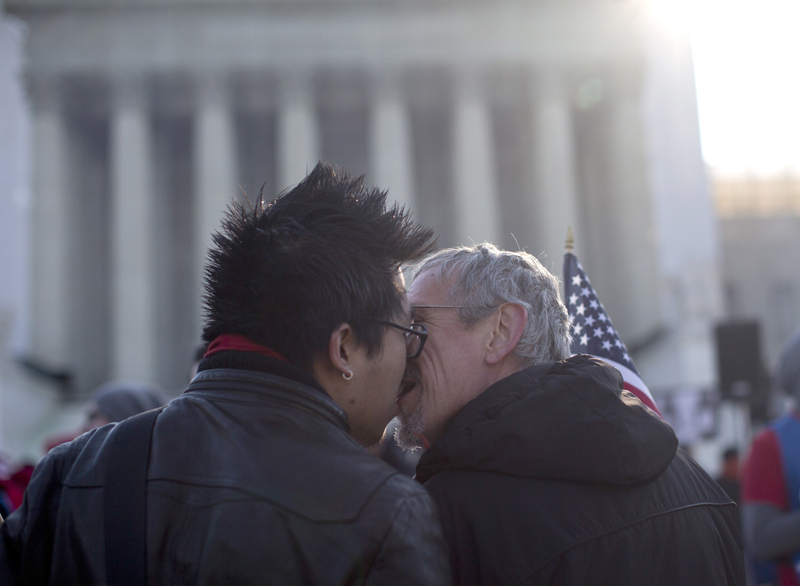A majority of the Supreme Court justices delivered a beating to the Defense of Marriage Act during oral arguments Wednesday, signaling a positive outcome for marriage equality.
The four liberal-leaning justices and Justice Anthony Kennedy appeared deeply skeptical that the federal government has legal justification for treating gay and straight couples unequally. They seemed inclined to overturn Section 3 of the 1996 law, which prohibits federal recognition of same-sex marriage and thereby denies benefits to gay and lesbian couples even if they are legally wed in their states.
In his line of questioning, Kennedy, who has a track record in favor of gay rights, repeatedly contended that the federal government had exceeded its constitutional authority.
“You are at real risk of running in conflict with what has always been thought to be the essence of the state police power, which is to regulate marriage, divorce, custody,” he told Paul Clement, the lawyer arguing in favor of upholding DOMA.
When Clement tried to argue that it was a valid exercise of federal power and does not infringe on states’ rights, Kennedy asked why Congress could deny benefits “where the voters have decided” that same sex marriage ought to be legal. “I think it is a DOMA problem,” he said. “The question is whether or not the federal government, under our federalism scheme, has the authority to regulate marriage.”
Chief Justice John Roberts, Justice Antonin Scalia and Samuel Alito appeared favorable to DOMA. They were preoccupied with the question of whether striking the law down could create a legal basis for the federal government to supersede state definitions of marriage.
The four Democratic-appointed justices — Ruth Bader Ginsburg, Stephen Breyer, Sonia Sotomayor and Elena Kagan — doubted DOMA’s validity under the equal protection clause.
“You’re treating married couples differently,” said Sotomayor.
Kagan wondered if Congress’ judgment when passing the law in 1996 “was infected by dislike, by fear, by animus” toward gays.
Breyer said he “can’t imagine” what the rational basis would be for denying benefits to married gay couples under federal law.
Ginsburg said recognition of marriage “affects every area of life,” mentioning hospital visits to sick partners and Social Security retirement benefits as examples. “It’s pervasive.”
Justice Clarence Thomas did not speak during the arguments, as is customary for him.
Before spending one hour hearing the merits of the case, the justices devoted 50 minutes to questions about whether the Supreme Court has jurisdiction to hear the issue. It’s an unusual case because the Obama administration declined to defend DOMA, a federal law, leaving the House Republican majority to step in and hire Clement, a former Bush White House Solicitor General, to argue for the law.
Most of the justices appeared to agree that the DOMA case had standing.

The lawyers pushing to overturn DOMA were U.S. Solicitor General Donald B. Verrilli and Roberta A. Kaplan, who represents plaintiff Edith Windsor (pictured above), a lesbian widow.
If DOMA is overturned, married gay couples would be treated the same as married straight couples under federal law, but states would remain free to outlaw gay marriage.
“A majority of justices today appeared to regard DOMA for what it is: a pervasive program of discrimination that changes 1100 laws and touches every aspect of life,” said Judith E. Schaeffer, the vice president of the liberal-leaning Constitutional Accountability Center.
Audio of DOMA oral arguments:
Read the transcript of DOMA oral arguments:






